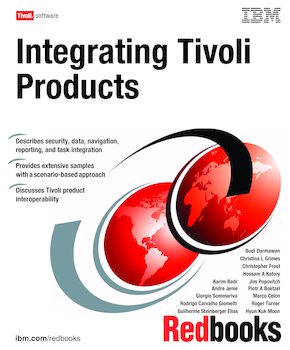Integrating Tivoli Products
An IBM Redbooks publication
Note: This is publication is now archived. For reference only.

Published on 10 December 2009, updated 02 November 2010
ISBN-10: 0738433586
ISBN-13: 9780738433585
IBM Form #: SG24-7757-00
Authors: Budi Darmawan, Andre Jenie, Christina L Grimes, Christopher Frost, Giorgio Sommariva, Guilherme Steinberger Elias, Hossam A Katory, Hyun Kuk Moon, Jim Popovitch, Karim Badr, Marco Celon, Piotr A Boetzel, Rodrigo Carvalho Giometti and Roger Turner
This IBM® Redbooks® publication attempts to provide a broad view of how Tivoli® system management products work together for use in several common scenarios. Seamless integration must be achieved for operation personnel to work with the solution. This integration is necessary to ensure that the product can be used easily by the user. Product integration contains multiple dimensions. We evaluate the implementation of the following areas:
- Security integration provides authentication to users from a single repository and a single login to multiple applications.
- Navigation integration allows multiple management applications to work with each other so that users can get more information across multiple applications.
- Data integration allows the exchange of resource or object information between solutions to allow the context to be established
seamlessly.
- Task integration permits one product to use and invoke a facility of another product.
We discuss both the implementation and also provide sample scenarios of how these integrations work. We based the scenarios on common real-life examples that IT operations often experience.
Finally, we also include additional information about topics, such as agent management, reporting, and product adoption routes.
Part 1. Introduction
Chapter 1. Integration overview
Chapter 2. Integration scenarios
Part 2. Implementation
Chapter 3. Product installation overview
Chapter 4. Security integration
Chapter 5. Data integration
Chapter 6. Navigation integration
Chapter 7. Self monitoring and management
Part 3. Scenario walk-through
Chapter 8. Operational drill down
Chapter 9. Automated application management scenario
Chapter 10. Executive IBM Tivoli Business Service Manager scenario
Chapter 11. Change and release management scenario